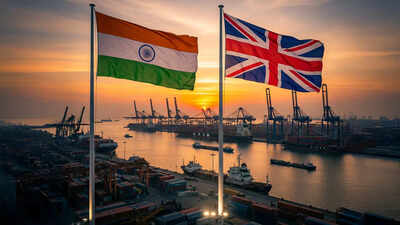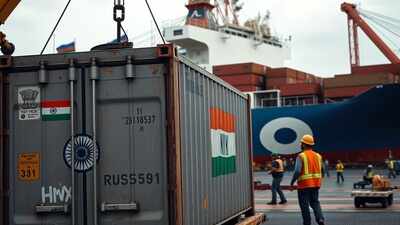India-UK trade deal: CETA opens duty-free access for Indian seafood; exporters eye 70% growth boost

The India-UK Comprehensive Economic and Trade Agreement (CETA) is likely to provide a major boost to India’s seafood and export sectors. The landmark pact was signed on Thursday, in the presence of Prime Minister Narendra Modi and UK Prime Minister Keir Starmer and was formalised by commerce minister Piyush Goyal and UK secretary of state for business and trade Jonathan Reynolds. As per news agency ANI, the agreement is expected to significantly benefit India’s marine exports by scrapping UK import tariffs that previously ranged from 0 to 21.5 per cent. These included duties on shrimp, squid, frozen pomfret, lobsters, and other seafood items under HS Codes 03, 05, 15, 23, 95, and 1603 to 1605. With CETA now in effect, all marine products in tariff category ‘A’ receive full duty exemption. However, certain prepared seafood items under HS 1601 remain excluded from benefits.India exported $104 million worth of seafood to the UK in 2024–25, with frozen shrimp accounting for $80 million alone. Despite this, India’s share in Britain’s $5.4 billion seafood market stands at just 2.25 per cent. Industry estimates now predict a 70 per cent increase in exports to the UK, supported by improved cost competitiveness, according to ANI.The fisheries sector supports nearly 28 million livelihoods in India and accounts for 8 per cent of global fish production. Over the past decade, seafood export volume jumped 60 per cent and value grew 88 per cent. According to ANI, the number of destinations expanded from 100 to 130 countries, and value-added product exports tripled to Rs 7,666 crore, reflecting a shift towards premium markets.CETA helps India level the field with countries like Vietnam and Singapore, which already enjoy UK duty benefits through their respective FTAs. This removes a key disadvantage previously faced by Indian exporters, especially for high-value products. States like Kerala, Tamil Nadu, Gujarat, Maharashtra, and Andhra Pradesh are well-positioned to lead this export surge, especially if they continue to align with the UK’s sanitary and phytosanitary standards.Experts say the deal’s scope goes beyond seafood. The landmark agreement provides zero-duty access to 99 per cent of tariff lines, with a key focus on labour-intensive areas other than seafood like textiles, leather, and gems and jewellery.It is expected to drive up exports in consumer goods, apparel, cosmetics, auto parts, and jewellery. As per news agency PTI, EY India’s Agneshwar Sen believes that Indian MSMEs and job creation in labour-heavy sectors would benefit, while UK firms gain deeper access to India’s growing market.The agreement also marks progress in services trade. ICRA chief economist Aditi Nayar was quoted by PTI as saying that India stands to gain from UK concessions in IT, financial services, education, and professional mobility. An added social security pact allows Indian professionals to be exempt from UK contributions for three years, making overseas employment more financially viable.





